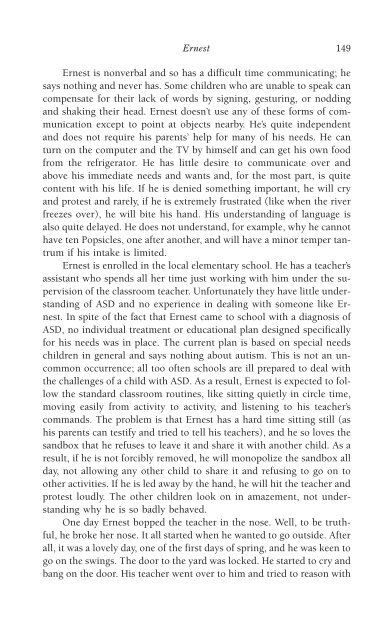978-1572305441
autism
autism
Create successful ePaper yourself
Turn your PDF publications into a flip-book with our unique Google optimized e-Paper software.
Ernest 149<br />
Ernest is nonverbal and so has a difficult time communicating; he<br />
says nothing and never has. Some children who are unable to speak can<br />
compensate for their lack of words by signing, gesturing, or nodding<br />
and shaking their head. Ernest doesn’t use any of these forms of communication<br />
except to point at objects nearby. He’s quite independent<br />
and does not require his parents’ help for many of his needs. He can<br />
turn on the computer and the TV by himself and can get his own food<br />
from the refrigerator. He has little desire to communicate over and<br />
above his immediate needs and wants and, for the most part, is quite<br />
content with his life. If he is denied something important, he will cry<br />
and protest and rarely, if he is extremely frustrated (like when the river<br />
freezes over), he will bite his hand. His understanding of language is<br />
also quite delayed. He does not understand, for example, why he cannot<br />
have ten Popsicles, one after another, and will have a minor temper tantrum<br />
if his intake is limited.<br />
Ernest is enrolled in the local elementary school. He has a teacher’s<br />
assistant who spends all her time just working with him under the supervision<br />
of the classroom teacher. Unfortunately they have little understanding<br />
of ASD and no experience in dealing with someone like Ernest.<br />
In spite of the fact that Ernest came to school with a diagnosis of<br />
ASD, no individual treatment or educational plan designed specifically<br />
for his needs was in place. The current plan is based on special needs<br />
children in general and says nothing about autism. This is not an uncommon<br />
occurrence; all too often schools are ill prepared to deal with<br />
the challenges of a child with ASD. As a result, Ernest is expected to follow<br />
the standard classroom routines, like sitting quietly in circle time,<br />
moving easily from activity to activity, and listening to his teacher’s<br />
commands. The problem is that Ernest has a hard time sitting still (as<br />
his parents can testify and tried to tell his teachers), and he so loves the<br />
sandbox that he refuses to leave it and share it with another child. As a<br />
result, if he is not forcibly removed, he will monopolize the sandbox all<br />
day, not allowing any other child to share it and refusing to go on to<br />
other activities. If he is led away by the hand, he will hit the teacher and<br />
protest loudly. The other children look on in amazement, not understanding<br />
why he is so badly behaved.<br />
One day Ernest bopped the teacher in the nose. Well, to be truthful,<br />
he broke her nose. It all started when he wanted to go outside. After<br />
all, it was a lovely day, one of the first days of spring, and he was keen to<br />
go on the swings. The door to the yard was locked. He started to cry and<br />
bang on the door. His teacher went over to him and tried to reason with



